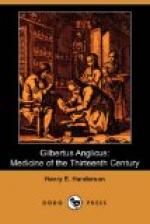In the allied department of obstetrics we find chapters on the signs of conception, on the urine in pregnant women, on difficult labor, prolapsus uteri, retention of the placenta, post partum hemorrhage, afterpains, and the oedema of pregnancy. The causes of difficult labor, according to Gilbert, are malposition, dropsy, immoderate size and death of the fetus, debility of the uterus and obstruction of the maternal passages. Malpositions are to be corrected by the hand of the midwife (obstetrix). Adjuvant measures are hot baths, poultices, inunctions, fumigations and sternutatories, and the use of certain herbs.
In the departments of general medicine not as yet entirely appropriated by specialists it will suffice to mention scrofula, pleurisy and pneumonia, hemoptysis, empyema, phthisis, cardiac affections, diseases of the stomach, liver and spleen, diarrhoea and dysentery, intestinal worms, dropsy, jaundice, cancer, rheumatism and gout, small-pox, measles, leprosy and hydrophobia, all of which claim more or less attention.
Peripneumonia and pleurisy are both inflammations of the chest, the former affecting the lungs, the latter the diaphragm and the pellicle which lines the ribs. The prominent symptoms of both diseases are pain in the chest or side, cough and fever and dyspnoea. Accidents or sequelae are hemoptysis, empyema and phthisis.
Empima (empyema) is the hawking-up of sanies, with infection of the lung and a sanious habit. Hence persons laboring under pneumonia or pleurisy are not necessarily empyemics, but when these diseases progress to such a point that blood and sanies are expectorated and the lung is infected, that is when the ulceration of the lungs fails to heal and corruption and infection occur, the disease becomes empima, and is with difficulty, or never cured.
Ptisis is a substantial consumption of the humidity of the body, due to ulceration of the lungs. For when a solution of continuity occurs in the lungs, the inspiratory and expiratory forces fail. Hence the lungs do not inspire sufficient air to mitigate the innate heat of the heart, and the heart fails to purify itself of the fumosity or fumous vapors generated in itself. Accordingly, deprived of the means of mitigating its heat or ventilating its fumosities, the spirits within it become unduly heated, and a consuming fire is generated in the entire body.
The symptoms of ptisis are a continued fever, greater or less, detected in the palms of the hands and the soles of the feet, thirst, a roughness of the tongue, slenderness of the neck, wasting of the entire body, constipation, wasting and shrinking of the finger-nails and fingers, hollowness of the eyes, pain in the left scapula extending to the shoulder, pharyngeal catarrh with abundant and mucilaginous sputum and a tendency to lachrymation. If the sputum thrown upon the coals emits a fetid odor, it is a sign of confirmed ptisis, which is incurable. The disease when it




